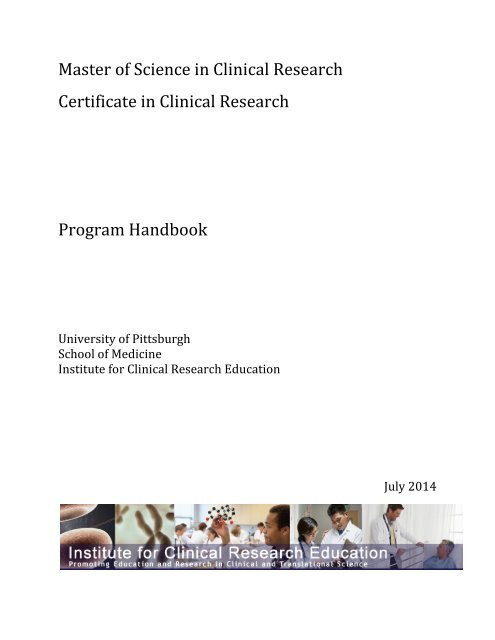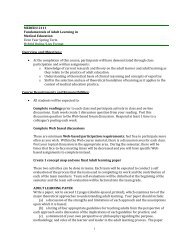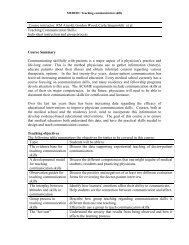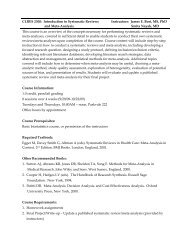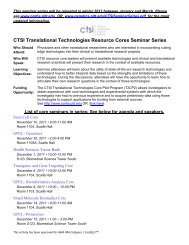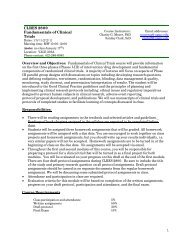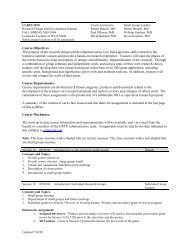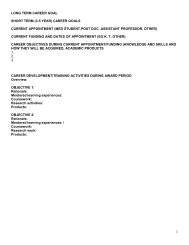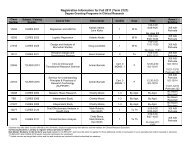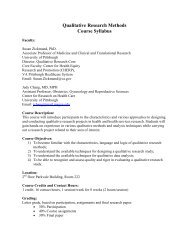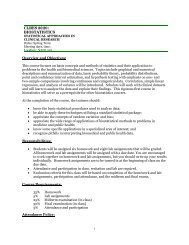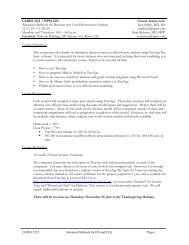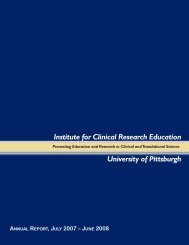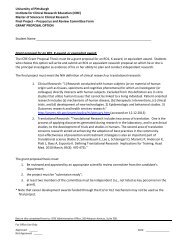Student Handbook - Institute for Clinical Research Education
Student Handbook - Institute for Clinical Research Education
Student Handbook - Institute for Clinical Research Education
You also want an ePaper? Increase the reach of your titles
YUMPU automatically turns print PDFs into web optimized ePapers that Google loves.
Master of Science in <strong>Clinical</strong> <strong>Research</strong><br />
Certificate in <strong>Clinical</strong> <strong>Research</strong><br />
Program <strong>Handbook</strong><br />
University of Pittsburgh<br />
School of Medicine<br />
<strong>Institute</strong> <strong>for</strong> <strong>Clinical</strong> <strong>Research</strong> <strong>Education</strong><br />
July 2014
<strong>Institute</strong> <strong>for</strong> <strong>Clinical</strong> <strong>Research</strong> <strong>Education</strong> (ICRE)<br />
Degree Programs in <strong>Clinical</strong> <strong>Research</strong> and <strong>Clinical</strong> and<br />
Translational Science<br />
This handbook provides in<strong>for</strong>mation about the policies and procedures pertaining to the <strong>Clinical</strong><br />
<strong>Research</strong> Degree Programs, the School of Medicine, and the University of Pittsburgh. Although the<br />
material contained within the handbook is reviewed and updated once a year, changes may occur<br />
during the year and are announced in memos, on the website, and by email so that students are<br />
notified in a timely manner.<br />
Degree Granting Programs in <strong>Clinical</strong> <strong>Research</strong> Contact In<strong>for</strong>mation:<br />
<strong>Institute</strong> <strong>for</strong> <strong>Clinical</strong> <strong>Research</strong> <strong>Education</strong><br />
200 Meyran Avenue, Suite 300<br />
Pittsburgh, PA 15213<br />
Phone: 412-692-2686<br />
Fax: 412-586-9672<br />
icre@pitt.edu (email)<br />
The University of Pittsburgh, as an educational institution and as an employer, values equality of<br />
opportunity, human dignity, and racial/ethnic and cultural diversity. Accordingly, the University<br />
prohibits and will not engage in discrimination on the basis of race, color, religion, national origin,<br />
ancestry, sex, age, marital status, family status, sexual orientation, disability, or status as a disabled<br />
veteran or a veteran of the Vietnam era. Further, the University will continue to take affirmative<br />
steps to support and advance these values consistent with the University’s mission. This policy<br />
applies to admissions, employment, and access to and treatment in University programs and<br />
activities. This is a commitment made by the University and is in accordance with federal, state, and<br />
local laws and regulations. All relevant programs are administered by the Office of Affirmative<br />
Action, 901 William Pitt Union, University of Pittsburgh, Pittsburgh, PA 15260. <strong>Student</strong>s, employees,<br />
or applicants should contact the Office of Affirmative Action immediately in all cases in which<br />
discrimination is alleged. For more in<strong>for</strong>mation, call 412-648-7860.<br />
1
Table of Contents<br />
I. Introduction to the ICRE and <strong>Clinical</strong> <strong>Research</strong> Degree Programs ........................................................... 4<br />
A. <strong>Institute</strong> <strong>for</strong> <strong>Clinical</strong> <strong>Research</strong> .............................................................................................................................. 4<br />
B. Degree Granting Programs in <strong>Clinical</strong> <strong>Research</strong> .......................................................................................... 4<br />
II. <strong>Clinical</strong> <strong>Research</strong> Degree Program Requirements ........................................................................................... 5<br />
A. Master of Science in <strong>Clinical</strong> <strong>Research</strong> ............................................................................................................. 5<br />
1. Course Requirements: ........................................................................................................................................ 5<br />
2. Core Curriculum ................................................................................................................................................... 6<br />
3. <strong>Research</strong> Design and Development .............................................................................................................. 6<br />
4. Specialty Tracks (Required) ............................................................................................................................ 6<br />
5. Content Specialization (Optional) ................................................................................................................. 6<br />
6. Comprehensive Competency Review........................................................................................................... 6<br />
7. Thesis or Substantive <strong>Research</strong> Project ...................................................................................................... 6<br />
B. Certificate in <strong>Clinical</strong> <strong>Research</strong> ............................................................................................................................ 8<br />
1. Course Requirements ......................................................................................................................................... 8<br />
2. Core Curriculum ................................................................................................................................................... 8<br />
III. General Academic Program In<strong>for</strong>mation ........................................................................................................ 9<br />
A. Statute of Limitations .............................................................................................................................................. 9<br />
B. Leave of Absence ....................................................................................................................................................... 9<br />
C. Cross Registration ..................................................................................................................................................... 9<br />
D. Waiver of Requirements ........................................................................................................................................ 9<br />
E. Grading Policy............................................................................................................................................................. 9<br />
F. Tuition ......................................................................................................................................................................... 10<br />
G. Building Emergency or Inclement Weather Policy ................................................................................... 10<br />
IV. ICRE Academic Values and Code of Professionalism ............................................................................... 11<br />
V. Guidelines <strong>for</strong> Ethical Practices in <strong>Research</strong> .................................................................................................... 13<br />
VI. ICRE Program Guidelines .................................................................................................................................... 13<br />
A. Attendance ................................................................................................................................................................. 13<br />
B. Course Registration and Academic Advising ............................................................................................... 13<br />
C. CourseWeb ................................................................................................................................................................. 13<br />
D. University of Pittsburgh Email .......................................................................................................................... 14<br />
2
E. Course Evaluation ................................................................................................................................................... 14<br />
F. Required and Supplemental Textbooks ......................................................................................................... 14<br />
VII. Program Governance ............................................................................................................................................. 15<br />
A. Degree Granting Programs in <strong>Clinical</strong> <strong>Research</strong> ........................................................................................ 15<br />
B. <strong>Institute</strong> <strong>for</strong> <strong>Clinical</strong> <strong>Research</strong> <strong>Education</strong> ...................................................................................................... 15<br />
C. University of Pittsburgh School of Medicine Graduate Studies Office .............................................. 16<br />
VIII. Appendices ................................................................................................................................................................ 17<br />
IX. Appendix A: Master of Science in <strong>Clinical</strong> <strong>Research</strong> Plan of Study ..................................................... 18<br />
X. Appendix B: Master of Science in <strong>Clinical</strong> <strong>Research</strong> Content Specialization ....................................... 21<br />
A. Content Specialization in Health Care Disparities and Underserved Community <strong>Research</strong> ... 21<br />
B. Content Specialization in Palliative Care <strong>Research</strong> ................................................................................... 21<br />
XI. Appendix C: Comprehensive Competency Review ................................................................................... 22<br />
XII. Appendix C.i: Written Reflections .................................................................................................................... 23<br />
XIII. Appendix C.ii: Evidence of Competence ......................................................................................................... 23<br />
XIV. Appendix D: Certificate in <strong>Clinical</strong> <strong>Research</strong> Plan of Study ................................................................... 25<br />
XV. Appendix E: ICRE Academic Integrity Pledge ............................................................................................. 26<br />
XVI. Appendix F: ICRE Academic Integrity Violation Reporting Procedure ............................................ 27<br />
XVII. Appendix G: <strong>Student</strong> Obligations ................................................................................................................. 28<br />
XVIII. Appendix H: Faculty Obligations.................................................................................................................. 29<br />
3
I. Introduction to the ICRE and <strong>Clinical</strong> <strong>Research</strong> Degree Programs<br />
A. <strong>Institute</strong> <strong>for</strong> <strong>Clinical</strong> <strong>Research</strong><br />
The <strong>Institute</strong> <strong>for</strong> <strong>Clinical</strong> <strong>Research</strong> <strong>Education</strong> (ICRE) is the home <strong>for</strong> the University of Pittsburgh's<br />
premier clinical and translational research training programs as well as the home <strong>for</strong> the <strong>Research</strong><br />
<strong>Education</strong> and Career Development Core of the <strong>Clinical</strong> and Translational Science <strong>Institute</strong> (CTSI).<br />
The foundation of the ICRE’s clinical research training enterprise consists of the Degree Granting<br />
Programs in <strong>Clinical</strong> <strong>Research</strong>.<br />
• Mission:<br />
The mission of the ICRE is to offer the highest-caliber training and education in clinical research<br />
to all levels of trainees in the Schools of the Health Sciences (SHS) and to enhance collaboration<br />
among trainees from multiple disciplines.<br />
• Objectives<br />
The ICRE's primary objectives are to develop, nurture, and support a cadre of clinical and<br />
translational scientists by building on the University of Pittsburgh's existing clinical research<br />
training programs to establish a comprehensive program with activities ranging from early<br />
research exposure <strong>for</strong> high school students to programs <strong>for</strong> faculty.<br />
B. Degree Granting Programs in <strong>Clinical</strong> <strong>Research</strong><br />
The MS and certificate programs in <strong>Clinical</strong> <strong>Research</strong> at the University Of Pittsburgh School Of<br />
Medicine prepare trainees to learn, design and conduct high-quality clinical and translational<br />
research.<br />
• Objectives<br />
o To attract highly talented individuals from a broad range of disciplines with interest in<br />
clinical and translational research and teach them the critical skills needed to become<br />
successful clinical researchers.<br />
o To provide a rigorous core curriculum encompassing all of the major aspects necessary<br />
<strong>for</strong> the design and conduct of clinical and translational research.<br />
o To offer specialized, methods-based foci that allow trainees to tailor coursework to<br />
meet their individual needs <strong>for</strong> clinical and translational research training.<br />
4
II.<br />
<strong>Clinical</strong> <strong>Research</strong> Degree Program Requirements<br />
A. Master of Science in <strong>Clinical</strong> <strong>Research</strong><br />
To obtain a Master of Science in <strong>Clinical</strong> <strong>Research</strong>, students must complete a minimum of 30 credit<br />
hours of coursework, including the core curriculum in clinical research, the year-long grant-writing<br />
course, required courses <strong>for</strong> one of the specialty tracks focused on research methodologies, and<br />
requirements <strong>for</strong> a thesis or substantive research project. Interested students also may take 6<br />
credit hours of coursework in one of the optional content specializations. Depending on individual<br />
clinical responsibilities and the total number of courses taken, the Master of Science in <strong>Clinical</strong><br />
<strong>Research</strong> generally requires 2 years or more to fulfill all of the requirements. The timing and<br />
scheduling <strong>for</strong> many of the courses in the program are designed to help students balance their<br />
multiple responsibilities.<br />
For University of Pittsburgh regulations regarding Master of Science degrees, see the following<br />
website:<br />
http://www.pitt.edu/~graduate/regmasters.html<br />
1. Course Requirements:<br />
<strong>Student</strong>s must complete the required core curriculum in <strong>Clinical</strong> <strong>Research</strong>. In addition, most<br />
students are required to complete <strong>Research</strong> Design and Development Parts I and II (year- long<br />
grant writing course).<br />
Summer Term Fall Term Spring Term<br />
CLRES 2005: Computer<br />
Methods in <strong>Clinical</strong> <strong>Research</strong> (1<br />
credit)<br />
CLRES 2010: <strong>Clinical</strong> <strong>Research</strong><br />
Methods (3 credits)<br />
CLRES 2020: Biostatistics (4<br />
credits)<br />
CLRES 2040: Measurement in<br />
<strong>Clinical</strong> <strong>Research</strong> (1 credit)<br />
CLRES 2071/2072: <strong>Research</strong> Design and Development Parts I<br />
and II (5 credits)<br />
** This may change to being offered as one 3 credit course in<br />
Fall 2015.<br />
Specialty Track and<br />
Elective Coursework<br />
CLRES 2050: Ethics and<br />
Regulation of <strong>Research</strong> (1 credit)<br />
Specialty Track and Elective<br />
Coursework<br />
5
2. Core Curriculum<br />
The purpose of the core curriculum is to provide trainees with the basic set of skills that are<br />
required by clinical investigators in all fields of interest. These skills include an understanding of<br />
research design, epidemiologic methods, biostatistics, study and survey design, measurement of<br />
outcomes, and ethical and regulatory principles of research involving human subjects. There may<br />
be additional requirements, depending on the specific research training path. The core curriculum<br />
can be taken in its entirety in the summer. It is possible to split the core curriculum over two<br />
summer terms. The Ethics and Regulation of <strong>Research</strong> course is only offered in the spring term. A<br />
detailed plan of study <strong>for</strong> the Master of Science in <strong>Clinical</strong> <strong>Research</strong> can be found in Appendix A.<br />
3. <strong>Research</strong> Design and Development<br />
The <strong>Research</strong> Design and Development course can be taken only after the core curriculum<br />
coursework is completed. It is taken in conjunction with the Ethics and Regulation of <strong>Research</strong><br />
course. The <strong>Research</strong> Design and Development course focuses on research design and development<br />
during the fall and spring terms.<br />
• CLRES 2071 <strong>Research</strong> Design and Development Part I (3 credits, Fall)<br />
• CLRES 2072 <strong>Research</strong> Design and Development Part II (2 credits, Spring)<br />
** This may change to being offered as one course <strong>for</strong> 3 credits in Fall 2015.<br />
4. Specialty Tracks (Required)<br />
<strong>Student</strong>s must elect one of the following specialty tracks (detailed in<strong>for</strong>mation in Appendix A):<br />
• Health Services <strong>Research</strong> (Track Director Mark Roberts, MD, MPP)<br />
• <strong>Clinical</strong> Trials (Track Director Charity Moore, PhD)<br />
• Comparative Effectiveness (Track Director Doug Landsittel, PhD)<br />
• Translational <strong>Research</strong> (To be determined)<br />
5. Content Specialization (Optional)<br />
<strong>Student</strong>s may, if they wish, choose to focus in a particular content specialization. To do this, they<br />
must take 6 credits hours of relevant coursework in one of the following areas (detailed<br />
in<strong>for</strong>mation in Appendix B):<br />
• Health Disparities and Underserved Community <strong>Research</strong><br />
• Palliative Care<br />
6. Comprehensive Competency Review<br />
After completion of 15 credits inclusive of the core (CLRES 2005, CLRES 2010, CLRES 2020, CLRES<br />
2040 and CLRES 2050) and five additional credits, and be<strong>for</strong>e registering <strong>for</strong> any thesis credits,<br />
students will meet with their Specialty Track Director, and one member of the ICRE’s Competency-<br />
Based <strong>Education</strong> Committee <strong>for</strong> a Comprehensive Competency Review (Appendix C).<br />
7. Thesis or Substantive <strong>Research</strong> Project<br />
Individuals pursuing the Master of Science in <strong>Clinical</strong> <strong>Research</strong> are required to complete a <strong>for</strong>mal<br />
thesis or substantive research project. The project will count <strong>for</strong> up to 3 credits and must satisfy the<br />
following requirements:<br />
• Be primarily independent work by the trainee,<br />
6
• receive preliminary approval from both the trainee's advisor and the ICRE Leadership,<br />
• <strong>for</strong>m the basis <strong>for</strong> a comprehensive review of competence by a <strong>for</strong>mal review committee<br />
There are three standard mechanisms that are considered appropriate <strong>for</strong> the substantive research<br />
project (see below), subject to ICRE approval. To obtain approval, the trainee must complete a<br />
Prospectus and Review Committee Form the last day of the term PRIOR to the term you wish to<br />
register <strong>for</strong> CLRES 2080: Masters Thesis <strong>Research</strong> credits. The prospectus must be approved by the<br />
student’s advisor and the Director of Academic Programs be<strong>for</strong>e the student may proceed. The<br />
Prospectus <strong>for</strong>ms are provided to students at the beginning of each term via email or by contacting<br />
the ICRE Degree Program Staff.<br />
The mechanisms <strong>for</strong> the substantive project include:<br />
• A standard thesis option: trainees may elect to complete a master's thesis in their field of<br />
specialty. A thesis produced under this option must con<strong>for</strong>m to all applicable university policies<br />
regarding theses (visit www.pitt.edu/~graduate/etd <strong>for</strong> details on submitting theses<br />
electronically).<br />
• R01, K-award, or equivalent grant application: Eligible students may submit a completed R01 or<br />
equivalent research proposal (<strong>for</strong> which they are the principal investigator) as evidence of their<br />
ability to plan and conduct independent research. To serve as the substantive project <strong>for</strong> the<br />
Master of Science in <strong>Clinical</strong> <strong>Research</strong>, the proposal must be reviewed and approved by the<br />
appropriate scientific review committee in the trainee's department. Note that career<br />
development awards funded through the KL2 or K12 mechanism may not be used as the final<br />
project.<br />
• Peer review publications: The compilation of two completed first author papers related to the<br />
trainee's research may be used as evidence of independent work at the discretion of the<br />
individual specialty track. The papers must be original research papers and be written in a<br />
competitive manner. Each paper must be reviewed by at least 2 committee members who are<br />
not coauthors. At least one member of the committee must be independent (i.e., not a coauthor<br />
on either paper), and no committee member (except the trainee’s mentor) can be a coauthor on<br />
both papers.<br />
Each of the options listed above must be reviewed and defended be<strong>for</strong>e a review committee, and<br />
members of the committee must be identified when the trainee submits the prospectus and review<br />
committee <strong>for</strong>m <strong>for</strong> approval. The ICRE Review Committee is chaired by your ICRE academic<br />
advisor (or another ICRE faculty member named by the advisor). The Committee also must include<br />
your mentor, another ICRE faculty member, and at least one ad hoc member familiar with your<br />
project. The ICRE committee member will determine if an additional reviewer with statistical or<br />
other methodological expertise is necessary.<br />
7
The trainee's presentation to the review committee should be scheduled at least two months<br />
prior to graduation to allow enough time <strong>for</strong> revisions and subsequent reviews. Once approval is<br />
granted by the review committee and <strong>for</strong>mal documentation is submitted to the ICRE, the trainee<br />
will receive a passing grade and will be permitted to proceed with the graduation ceremonies.<br />
B. Certificate in <strong>Clinical</strong> <strong>Research</strong><br />
To obtain a Certificate in <strong>Clinical</strong> <strong>Research</strong>, students must complete a minimum of 15 credit hours<br />
of coursework, including the core curriculum in clinical research and 5 elective credits. Depending<br />
on individual clinical responsibilities and the total number of courses taken, the Certificate in<br />
<strong>Clinical</strong> <strong>Research</strong> generally requires 1 - 2 years of study to fulfill all the requirements; students have<br />
up to 4 years though to complete. The timing and scheduling <strong>for</strong> many of the courses in the<br />
program are designed to help students balance their multiple responsibilities. In addition to the<br />
regular Certificate in <strong>Clinical</strong> <strong>Research</strong>, there is also the Certificate in <strong>Clinical</strong> and Translational<br />
Science <strong>for</strong> Doctoral <strong>Student</strong>s in the Health Sciences (CTS Certificate). This certificate is <strong>for</strong> other<br />
PhD students in any of the Schools of Health Sciences and is completed in conjunction with their<br />
doctoral degree.<br />
1. Course Requirements<br />
<strong>Student</strong>s must complete the required core curriculum in <strong>Clinical</strong> <strong>Research</strong>. In addition, they are<br />
required to take 5 additional credits of elective coursework. A Plan of Study can be found in<br />
Appendix D.<br />
Summer Term Fall Term Spring Term<br />
CLRES 2005: Computer<br />
Methods in <strong>Clinical</strong> <strong>Research</strong> (1<br />
credit)<br />
CLRES 2010: <strong>Clinical</strong> <strong>Research</strong><br />
Methods (3 credits)<br />
CLRES 2020: Biostatistics (4<br />
credits)<br />
CLRES 2040: Measurement in<br />
<strong>Clinical</strong> <strong>Research</strong> (1 credit)<br />
Elective Credits<br />
CLRES 2050: Ethics and<br />
Regulation of <strong>Research</strong> (1 credit)<br />
2. Core Curriculum<br />
The purpose of the core curriculum is to provide trainees with the basic set of skills that are<br />
required by clinical investigators in all fields of interest. These skills include an understanding of<br />
research design, epidemiologic methods, biostatistics, study and survey design, measurement of<br />
outcomes, and ethical and regulatory principles of research involving human subjects. The core<br />
curriculum can be taken in its entirety in the summer. It is possible to split the core curriculum<br />
coursework over two summer terms. The Ethics and Regulation of <strong>Research</strong> course is only offered<br />
in the spring term.<br />
8
III.<br />
General Academic Program In<strong>for</strong>mation<br />
A. Statute of Limitations<br />
It is University policy that students complete the Certificate or Master of Science degree in four (4)<br />
years. Under extraordinary circumstances, students may apply <strong>for</strong> an extension of the statute of<br />
limitations. The request must be approved by the Director, Program Leadership, and the Dean.<br />
B. Leave of Absence<br />
Under special conditions, a student in the Master of Science program may be granted one leave of<br />
absence <strong>for</strong> a maximum amount of 1 year. When requesting a leave of absence, the student must<br />
state the rationale and must indicate the requested length of leave in advance. The request should<br />
be submitted to the Director, who in turn will make a recommendation to the Associate Dean. If<br />
approved by the Associate Dean, the time of the leave shall not count against the total time allowed<br />
<strong>for</strong> the degree being sought by the student.<br />
C. Cross Registration<br />
<strong>Student</strong>s may register <strong>for</strong> courses offered at institutions in the Pittsburgh Council on Higher<br />
<strong>Education</strong> (PCHE) cross-registration agreement (Carnegie Mellon, Duquesne University, the<br />
Pittsburgh Theological Seminary, and Robert Morris University.) Such coursework must be<br />
approved in advance by the student’s advisor. Credits will not be counted as transfers and will<br />
count toward the degree and GPA calculations.<br />
D. Waiver of Requirements<br />
If a student feels that his or her educational background precludes the need to take one or more of<br />
the required courses, the student should discuss this with their ICRE advisor and the Director of<br />
Academic Programs. The student is responsible to bring this matter to the attention of the Director<br />
of Academic Programs. The student will need to have the syllabi from the courses they feel meet<br />
the requirements. The Director of Academic Programs is responsible <strong>for</strong> granting the waiver and in<br />
special circumstances may request the advice of the course director. In some cases, the student<br />
may receive permission to take an examination to be exempted from a course.<br />
E. Grading Policy<br />
The following guidelines are based on University policy:<br />
• Graduate students must maintain a minimum grade point average (GPA) of 3.0 or better at all<br />
times. Failure to do so results in automatic academic probation.<br />
• Graduate students must receive satisfactory grades in each course. For required courses, a<br />
letter grade of “B” or better is needed. For elective courses, a letter grade of “B –”can count<br />
towards fulfillment of degree requirements, subject to approval by the Director of Academic<br />
Programs.<br />
• If a student receives a letter grade that falls below these thresholds (“B” <strong>for</strong> required courses, “B<br />
–” <strong>for</strong> elective courses), no course credit will be given. The University will not count these<br />
courses towards requirements. The student has the option to re-take these courses. <strong>Student</strong>s<br />
must officially enroll and pay <strong>for</strong> the class again. A repeated course, has a notation appearing<br />
9
underneath the previous course taken designating it has been excluded from the GPA. The<br />
course and grade remains on your record/transcript.<br />
• “G” and “I” Grades:<br />
o A "G" grade is given by an instructor when class work is unfinished because of<br />
extenuating personal circumstances. When given a "G" grade, you are usually instructed<br />
to complete some clearly defined work (e.g. a final examination paper) within a<br />
specified period of time. The "G" must be completed no later than one year after the<br />
term or session in which the class was taken. You should not request or be given a "G"<br />
grade if, in actuality, you need to repeat the course. See "Course Repeat" <strong>for</strong> more<br />
in<strong>for</strong>mation. Once the deadline has passed, a "G" grade will remain on your record and<br />
you will be required to register <strong>for</strong> the class again, if the class is needed to fulfill<br />
requirements <strong>for</strong> graduation. Contact your instructor <strong>for</strong> details regarding the issuance<br />
of a "G" grade.<br />
o An "I" grade is also issued by the instructor, and differs from a "G" grade. It is issued in<br />
the case of ongoing study such as incomplete research, work in individual guidance<br />
classes, clinical work or seminars.<br />
• “W” Grade: To withdraw from a class after the official end of the add/drop period while still<br />
enrolled in other courses, you must process a Monitored Withdrawal Request <strong>for</strong>m through the<br />
dean's office of the academic center offering the course. If approved, a grade of "W" will be<br />
recorded on your transcript <strong>for</strong> that course. "W" grades do not count toward a student's degree<br />
or grade point average. There is no tuition adjustment associated with a course withdrawal.<br />
F. Tuition<br />
<strong>Student</strong>s are responsible <strong>for</strong> covering the tuition costs, taxes, and fees associated with courses<br />
taken through the <strong>Institute</strong> <strong>for</strong> <strong>Clinical</strong> <strong>Research</strong> <strong>Education</strong> unless they have other funding sources.<br />
The <strong>Institute</strong> <strong>for</strong> <strong>Clinical</strong> <strong>Research</strong> <strong>Education</strong> does not provide financial aid. Current tuition rates <strong>for</strong><br />
graduate-level courses at the University of Pittsburgh can be viewed at:<br />
http://www.ir.pitt.edu/tuition/index.html<br />
Many individuals accepted into our degree-granting programs have faculty- or student-based<br />
affiliations with the University of Pittsburgh or University of Pittsburgh Medical Center (UPMC).<br />
Faculty, fellows, or residents at these institutions may be eligible <strong>for</strong> tuition benefits. For complete<br />
in<strong>for</strong>mation, contact the Faculty Records office at the University of Pittsburgh (412-624-4232) or<br />
UPMC Tuition Assistance Employee Service Center at 1-800-994-2752 (press option 3).<br />
G. Building Emergency or Inclement Weather Policy<br />
Scenario 1: The University is closed; the School of Medicine is closed.<br />
Scenario 2: The University cancels classes; the School of Medicine cancels classes.<br />
Scenario 3: The Parkvale Building is closed or instructor must cancel class due to extenuating<br />
circumstances.<br />
• Only the Chancellor may officially close the Pittsburgh campus of the University.<br />
10
• The University will remain open in all but the most extreme circumstances. However,<br />
University employees and students are urged to use their own discretion in deciding whether<br />
they can safely commute to work.<br />
• When a State of Emergency is declared by the Governor or other local governing official, school<br />
personnel are expected to abide by those directives, and there will be no classes.<br />
• ICRE Degree Program staff will contact students as soon as possible if the Parkvale Building or<br />
instructor cancels class. It is up to the instructor to decide if a make-up session <strong>for</strong> the missed<br />
class will be scheduled and/or required.<br />
IV.<br />
ICRE Academic Values and Code of Professionalism<br />
The University of Pittsburgh and the <strong>Institute</strong> <strong>for</strong> <strong>Clinical</strong> <strong>Research</strong> <strong>Education</strong> (ICRE) maintain an<br />
honor code <strong>for</strong> all students enrolled in educational programs. The ICRE expects all students to<br />
uphold the following values <strong>for</strong> academic integrity and Code of Professionalism. Please note that<br />
specific academic integrity policies may vary from instructor to instructor; it is up to the student to<br />
understand and follow each instructor’s policy and expectations.<br />
Every student shall be honor bound to refrain from cheating, from presenting<br />
work <strong>for</strong> evaluation which is not his or her own, from giving or obtaining<br />
unauthorized assistance during evaluation, and from falsifying data or reports.<br />
Every student shall be honor bound from lying under any circumstances. Every<br />
student has an obligation to cooperate in the investigation or disposition of any<br />
allegation of violation of the Honor Code and to report all violations which come<br />
under his or her observation.<br />
<strong>Student</strong>s sign and return the ICRE Academic Integrity Pledge at Orientation (Appendix F) and if<br />
found in violation of the ICRE Academic Integrity Policy will follow the steps outlined in the ICRE<br />
Academic Integrity Violation Reporting Procedure (Appendix G). In addition to these documents,<br />
students may refer to our <strong>Student</strong> Obligations (Appendix H) and Instructor Obligations (Appendix<br />
I).<br />
A. Academic Integrity*<br />
Examples of conduct which have been regarded as being in violation of academic integrity include<br />
but are not limited to the following:<br />
• Plagiarism<br />
• Representing the work of another as one’s own<br />
• Destroying or concealing educational materials meant <strong>for</strong> simultaneous use by others<br />
• Copying from an examination paper of another student<br />
• Allowing another to copy from one's examination paper<br />
• Reading a copy of the examination prior to the date of the examination without consent of the<br />
instructor<br />
• Giving or receiving aid on an examination under circumstances in which a reasonable<br />
person should have known that such aid was prohibited by the Honor Code<br />
• Using unauthorized resources in the completion of an examination<br />
11
If a student, commits a dishonorable act, it shall be considered a valid defense if the student reports<br />
himself or herself to an appropriate authority and conscientiously attempts to rectify the situation,<br />
be<strong>for</strong>e the dishonorable act is brought to the attention of the program. Any student, faculty<br />
member, administrative officer, or staff member of the ICRE may allege that a violation of academic<br />
integrity has occurred. Alleged violations should be brought to the attention of the Director of<br />
Academic Programs immediately. The Director of Academic Programs will review the alleged<br />
violation and follow the ICRE’s academic integrity violation reporting procedure. A written copy of<br />
the procedure may be obtained from the Degree Program Coordinator at any time.<br />
B. Code of Professionalism*<br />
Honesty<br />
In all situations, classroom, lab, and office, the student should be honest with, faculty members, and<br />
other students. Cheating, plagiarism, theft, and lying are all <strong>for</strong>ms of dishonest behavior.<br />
Fairness<br />
Classroom and research expectations should be clearly stated and met. The student has the right to<br />
expect fairness in treatment, just as the teaching faculty expects to receive fair treatment. Unfair<br />
behavior is not acceptable just because someone else displays such behavior.<br />
Respect<br />
Show respect <strong>for</strong> your teaching faculty and fellow students by attending each class, showing up on<br />
time, and staying <strong>for</strong> the entire class. Pay attention to the discussion and contribute meaningful<br />
responses.<br />
Responsibility<br />
Take responsibility <strong>for</strong> your actions. Discourage dishonest behaviors and dishonest activities in<br />
others.<br />
Communication<br />
In<strong>for</strong>m instructors or degree program staff in a timely manner when experiencing any issues that<br />
may impact your studies.<br />
* Adapted from the University of Pittsburgh School of Medicine ‘<strong>Student</strong> Code of Professionalism’<br />
and the School of Medicine Program in Integrative Molecular Biology (PIMB) <strong>Student</strong> <strong>Handbook</strong><br />
12
V. Guidelines <strong>for</strong> Ethical Practices in <strong>Research</strong><br />
The University of Pittsburgh seeks excellence in the pursuit of knowledge and requires all members<br />
of the University community, including its student body, to adhere to the highest standards of<br />
integrity in research. Detailed in<strong>for</strong>mation regarding the <strong>Research</strong> Integrity Policy at the University<br />
of Pittsburgh can be found at:<br />
http://www.bc.pitt.edu/policies/policy/11/11-01-01.html<br />
More detailed in<strong>for</strong>mation on the Guidelines <strong>for</strong> Ethical Practices in <strong>Research</strong> at the University of<br />
Pittsburgh Guidelines can be found at:<br />
http://www.pitt.edu/~provost/ethresearch.html<br />
VI.<br />
ICRE Program Guidelines<br />
A. Attendance<br />
Attendance is required of all students in degree-granting programs at ICRE. A computerized sign-in<br />
attendance system has been designed to collect attendance <strong>for</strong> all courses held in the Parkvale<br />
Building. All students must sign-in be<strong>for</strong>e entering the classroom at computers that can be found in<br />
the lobby area on the second and third floor of the Parkvale Building. <strong>Student</strong>s can begin to sign-in<br />
30 minutes be<strong>for</strong>e the scheduled class time up to the end of class. If you experience trouble with<br />
the sign-in, you should contact your course instructor to ensure you are given credit <strong>for</strong> attending<br />
class. Courses held in buildings other than the Parkvale Building may have a paper sign-in sheet<br />
distributed during class.<br />
If a student is not listed on the computerized sign-in roster <strong>for</strong> a course to which they are<br />
registered, they must add their name to the roster by clicking the link to add a member to the roster<br />
found at the bottom of the sign-in page.<br />
Watching a video of a recorded lecture does not substitute <strong>for</strong> attendance. Attendance exceptions<br />
are made at the instructor’s discretion.<br />
B. Course Registration and Academic Advising<br />
<strong>Student</strong>s are required to meet with their academic advisor (assigned to them at Orientation) each<br />
term. <strong>Student</strong>s are expected to come prepared when meeting with their advisor, students should<br />
take with them a blank enrollment <strong>for</strong>m, a list of proposed classes and be prepared to discuss their<br />
degree progression. <strong>Student</strong>s cannot register <strong>for</strong> classes unless they have a signed enrollment <strong>for</strong>m.<br />
C. CourseWeb<br />
Most, but not all, ICRE courses are made available on the University of Pittsburgh CourseWeb<br />
system. Available course materials include syllabi, announcements, and, <strong>for</strong> some courses, audio,<br />
audio with PowerPoint, and/or video recordings of the lectures.<br />
CourseWeb courses will be available sometime in the two week period be<strong>for</strong>e the start of the<br />
course, depending on availability of in<strong>for</strong>mation. At course completion, the CourseWeb site will<br />
13
continue to be accessible <strong>for</strong> two weeks after the last day of class. This extension provides enrolled<br />
students with an opportunity to save any files made available <strong>for</strong> the course. There will be no access<br />
to the course in<strong>for</strong>mation after that time unless an exemption is permitted by the instructor.<br />
D. University of Pittsburgh Email<br />
CourseWeb and all official University of Pittsburgh correspondence are directed to the student’s<br />
University of Pittsburgh email address (username@pitt.edu). <strong>Student</strong>s are responsible either <strong>for</strong><br />
reading email at their University of Pittsburgh email address or <strong>for</strong> <strong>for</strong>warding email messages to<br />
an email account that the student regularly uses.<br />
For in<strong>for</strong>mation on <strong>for</strong>warding your University of Pittsburgh email, see the University Email Help<br />
page at:<br />
http://technology.pitt.edu/help/help-index/email-accounts-help.html<br />
E. Course Evaluation<br />
All students are expected to complete a course evaluation survey at the end of each ICRE course.<br />
Course evaluations are distributed electronically on the last day of class and available <strong>for</strong> two<br />
weeks. All responses are confidential and will be presented to the instructor without any<br />
identification of the responder.<br />
F. Required and Supplemental Textbooks<br />
All required and supplemental textbooks can be purchased at the University of Pittsburgh Book<br />
Center:<br />
http://www.pitt.edu/~bookctr/<br />
The ICRE Reference Library (Parkvale Building, Suite 300, Room 306) has a collection of required<br />
and supplemental textbooks <strong>for</strong> ICRE courses. The books in the ICRE Reference Library are<br />
available <strong>for</strong> students to read in the Parkvale building only.<br />
14
VII. Program Governance<br />
A. Degree Granting Programs in <strong>Clinical</strong> <strong>Research</strong><br />
Charity Moore, PhD<br />
Director of Degree Granting Programs<br />
Director of the Core Curriculum<br />
327 Parkvale<br />
412-246-6961<br />
moorecg@upmc.edu<br />
Jennifer Holliman, MPA<br />
Program Coordinator<br />
306 Parkvale Building<br />
412-586-9673<br />
hollimanjm@upmc.edu<br />
TBD<br />
<strong>Student</strong> Services Coordinator<br />
300 Parkvale Building<br />
412-692-2686<br />
Lauren Talotta<br />
Instructional Technologist<br />
300 Parkvale Building<br />
412-586-9629<br />
talottals@upmc.edu<br />
B. <strong>Institute</strong> <strong>for</strong> <strong>Clinical</strong> <strong>Research</strong> <strong>Education</strong><br />
Wishwa N. Kapoor, MD, MPH<br />
Director<br />
Doris M. Rubio, PhD<br />
Co- Director<br />
Georgeanna Robinson, EdD<br />
Assistant Director<br />
300 Parkvale<br />
412-864-3024<br />
Patrick M. Reitz, MA<br />
Administrator<br />
304 Parkvale<br />
412-692-2018<br />
15
C. University of Pittsburgh School of Medicine Graduate Studies Office<br />
Arthur S. Levine, MD<br />
Senior Vice Chancellor of Health Sciences<br />
Dean of the School of Medicine<br />
401 Scaife Hall<br />
412-648-8975<br />
alevine@hs.pitt.edu<br />
John P. Horn, PhD<br />
Associate Dean of Graduate Studies<br />
524 Scaife Hall<br />
412-648-8957<br />
jph@pitt.edu<br />
Joyce D’Antonio, PhD<br />
Director<br />
524 Scaife Hall<br />
412-648-9786<br />
jad155@pitt.edu<br />
Clare Gauss<br />
Administrative Specialist<br />
524 Scaife Hall<br />
412-383-7965<br />
cgauss@medschool.pitt.edu<br />
Susanna Godwin<br />
Administrative Specialist<br />
524 Scaife Hall<br />
412-383-8716<br />
sgodwin@medschool.pitt.edu<br />
Jennifer Walker<br />
Assistant Director<br />
524 Scaife Hall<br />
412-383-7866<br />
jennifer@medschool.pitt.edu<br />
Carol Williams<br />
Admissions & Recruiting Coordinator<br />
524 Scaife Hall<br />
412-648-9003<br />
cawillia@medschool.pitt.edu<br />
16
VIII. Appendices<br />
Appendix A: Master of Science in <strong>Clinical</strong> <strong>Research</strong> Plan of Study<br />
Appendix B: Master of Science Content Specialization<br />
Appendix C: Comprehensive Competency Review<br />
Appendix D: Certificate in <strong>Clinical</strong> <strong>Research</strong> Plan of Study<br />
Appendix E: ICRE Academic Integrity Pledge<br />
Appendix F: ICRE Academic Integrity Violation Form<br />
Appendix G: <strong>Student</strong> Obligations<br />
Appendix H: Faculty Obligations<br />
17
IX.<br />
Appendix A: Master of Science in <strong>Clinical</strong> <strong>Research</strong> Plan of Study<br />
Trainees must successfully complete the required courses plus additional elective courses, selected<br />
with the trainee’s advisor, which are necessary to earn the Master of Science in <strong>Clinical</strong> <strong>Research</strong><br />
<strong>Education</strong>. The Master of Science trainee must select a track. Once the track has been selected, the<br />
trainee must take the required courses <strong>for</strong> that track. The trainee may select courses from the<br />
suggested track elective list or electives of their choosing.<br />
Required Core plus <strong>Research</strong> Design and Development Seminar<br />
Course<br />
Number<br />
Course Title<br />
Required/<br />
Elective<br />
Credits<br />
CLRES 2005 Computer Methods in <strong>Clinical</strong> <strong>Research</strong> Required 1<br />
CLRES 2010 <strong>Clinical</strong> <strong>Research</strong> Methods Required 3<br />
CLRES 2020<br />
Biostatistics: Statistical Approaches in <strong>Clinical</strong><br />
<strong>Research</strong><br />
Required 4<br />
CLRES 2040 Measurement in <strong>Clinical</strong> <strong>Research</strong> Required 1<br />
CLRES 2050 Ethics and Regulation of <strong>Clinical</strong> <strong>Research</strong> Required 1<br />
CLRES 2071* <strong>Research</strong> Design and Development Part I Required 3<br />
CLRES 2072* <strong>Research</strong> Design and Development Part II Required 2<br />
Total Credits 15<br />
* This course may be combined into one section <strong>for</strong> 3 credits beginning Fall 2015.<br />
<strong>Clinical</strong> Trials <strong>Research</strong> Track<br />
Course<br />
Number<br />
Course Title<br />
Required/ Elective<br />
Credits<br />
CLRES 2080 Master’s Thesis <strong>Research</strong> Required 1-3<br />
CLRES 2120 Cost-Effectiveness Analysis in Health Care Required 1<br />
CLRES 2800 Fundamentals in <strong>Clinical</strong> Trials Required 1<br />
CLRES 2810 Statistical Methods & Issues in <strong>Clinical</strong> Trials Required 1<br />
CLRES 2820 Special Topics in <strong>Clinical</strong> Trials Required 1<br />
Total Credits 7<br />
18
Comparative Effectiveness <strong>Research</strong> Track<br />
Course<br />
Number<br />
Course Title<br />
Required/ Elective<br />
Credits<br />
CLRES 2080 Master's Thesis <strong>Research</strong> Required 1-3<br />
CLRES 2107 Comparative Effectiveness <strong>Research</strong> Required 2<br />
CLRES 2108<br />
Electronic Health Records and Developing<br />
Patient Registries<br />
Required 1<br />
CLRES 2109 Design of CER Studies Required 1<br />
CLRES 2120 Cost-Effectiveness Analysis Required 1<br />
CLRES 2121 <strong>Clinical</strong> Decision Analysis Required 1<br />
CLRES 2300<br />
Introduction to Systematic Review and Meta-<br />
Analysis<br />
Required 1<br />
CLRES 2800 Fundamentals of <strong>Clinical</strong> Trials Required 1<br />
Total Credits 11<br />
Health Services <strong>Research</strong> Track<br />
Course<br />
Number<br />
Course Title Required/ Elective Credits<br />
CLRES 2080<br />
Master’s Thesis <strong>Research</strong><br />
Required 1-3<br />
CLRES 2021 Analysis of Variance (ANOVA) and Regression Required 1<br />
CLRES 2022<br />
Logistic Regression<br />
Required 1<br />
CLRES 2023<br />
Survival Analysis<br />
Required 1<br />
CLRES 2026<br />
Analysis of Correlated Data<br />
Required 1<br />
CLRES 2107 Comparative Effectiveness <strong>Research</strong> Required 2<br />
CLRES 2120<br />
Cost-Effectiveness Analysis in Health Care<br />
Required 1<br />
Total Credits 10<br />
19
Translational <strong>Research</strong> Track<br />
Course<br />
Number<br />
Course Title Required/ Elective Credits<br />
CLRES 2080<br />
Master’s Thesis <strong>Research</strong><br />
Required 1-3<br />
CLRES 2021 Analysis of Variance (ANOVA) and Regression Required 1<br />
CLRES 2022<br />
CLRES 2700<br />
CLRES 2725<br />
PHARM<br />
3140 *<br />
Logistic Regression<br />
Fundamentals of Bench <strong>Research</strong><br />
Translational <strong>Research</strong> Practicum<br />
Introduction to Translational <strong>Research</strong> in the<br />
Health Sciences<br />
Required 1<br />
Required 3<br />
Required 1-2<br />
Required 2<br />
Total Credits 10<br />
* <strong>Student</strong>s may opt out of this course<br />
20
X. Appendix B: Master of Science in <strong>Clinical</strong> <strong>Research</strong> Content<br />
Specialization<br />
Trainees pursuing the Master of Science in <strong>Clinical</strong> <strong>Research</strong> must choose a specialty track and<br />
may also choose to further focus their research by taking 6 credits of coursework <strong>for</strong> an optional<br />
content specialization and submitting a research paper in that area. Two content specializations<br />
are currently available. For more in<strong>for</strong>mation:<br />
http://www.icre.pitt.edu/degrees/cs.html<br />
A. Content Specialization in Health Care Disparities and Underserved<br />
Community <strong>Research</strong><br />
This content specialization is designed to provide advanced training in health services research<br />
that focuses on underserved populations and health care disparities. Courses chosen from the<br />
following list will provide trainees with skills and analytic methods that are appropriate <strong>for</strong><br />
disparities and community-based research and will help trainees identify and address problems<br />
facing underserved communities. Larissa Myaskovsky, PhD, is the point of contact <strong>for</strong> this content<br />
specialization: http://www.dom.pitt.edu/dgim/faculty_info.aspxfp=5457.<br />
Required Courses:<br />
• CLRES 2200: Introduction to <strong>Research</strong> on Disparities in Health Care (2cr, Fall Term)<br />
• MEDEDU 2240: Cultural Competence in Medical <strong>Education</strong> (1cr, Spring term)<br />
B. Content Specialization in Palliative Care <strong>Research</strong><br />
This content specialization is designed to provide trainees with the following: didactic training in a<br />
broad spectrum of research methodologies, technologies, and tools; exposure to multidisciplinary<br />
research teams, hands-on mentored experience in conducting patient-oriented research; and the<br />
conceptual and writing skills necessary to submit competitive grant applications <strong>for</strong> successful,<br />
long-term patient-oriented research careers. Robert Arnold, MD, is the point of contact <strong>for</strong> this<br />
content specialization: http://www.dom.pitt.edu/dgim/faculty_info.aspxfp=4804.<br />
Required Courses:<br />
• CLRES 2601: Principles and Practice in Palliative Care Part I (1cr, Summer term)<br />
• CLRES 2602: Principles and Practice in Palliative Care Part II (1cr, Fall term)<br />
• CLRES 2610: <strong>Research</strong> Methods in Palliative Care (1cr, Spring term)<br />
21
XI.<br />
Appendix C: Comprehensive Competency Review<br />
The MS in clinical research is intended to train you in the skills, knowledge and professional norms<br />
appropriate <strong>for</strong> clinical researchers, with a specialization in one of four tracks. To help students be<br />
confident that they are on track to develop competence in all the key areas, the Comprehensive<br />
Competency Review (CCR) meeting takes place at the midpoint of the degree.<br />
Timing:<br />
<strong>Student</strong>s who are completing the masters in 2 years will arrange their CCR meeting around the end<br />
of their second semester, usually prior to completing class registration <strong>for</strong> the following academic<br />
year. <strong>Student</strong>s who plan to take more than 2 years to earn their degree will have their meeting<br />
around the time they complete 15 credits.<br />
Process:<br />
<strong>Student</strong>s provide written answers to 3 questions (Appendix C.i) that ask students to reflect on their<br />
learning in the program thus far. These answers should be no more 250 words, and can be bullet<br />
points. They also gather 1 piece of evidence <strong>for</strong> each of the 11 competencies, which should also be<br />
no more than 1 page each (Appendix C.ii).<br />
The committee reviews the evidence and written statements prior to the meeting. During the<br />
meeting, faculty discuss with the student why they chose specific pieces of evidence, concentrating<br />
on pieces that may not show the highest level of competence, or where some explanation is<br />
required. Faculty encourage the student to reflect on their learning and areas <strong>for</strong> improvement in<br />
the second half of the program, guided by the students’ written answers.<br />
Finally, the committee and the student discuss the student’s thesis plans, ensuring that necessary<br />
skills and knowledge can be gained from the classes the student intends to take.<br />
At the end of the meeting, the student steps out <strong>for</strong> a short period of committee discussion. The<br />
track director completes the Comprehensive Review Form, detailing areas of competence and areas<br />
<strong>for</strong> improvement, agreed steps <strong>for</strong> improvement, courses the student should take, and focus of<br />
thesis. All committee members and the student sign the <strong>for</strong>m, and the track director indicates<br />
whether the student has passed the review.<br />
Committee:<br />
• Specialty Track Director and,<br />
• a member of the ICRE’s CBE committee (Drs. Fowler, Kapoor, McTigue, Moore, Robinson).<br />
Organization:<br />
<strong>Student</strong>s are responsible <strong>for</strong> the scheduling of their CR meetings. <strong>Student</strong>s must provide the<br />
committee with electronic copies of their documents (as a single file) at least 1 week be<strong>for</strong>e their<br />
meeting. Track directors are responsible <strong>for</strong> delivering the completed CR Form to the degree<br />
program coordinator.<br />
22
Unsatisfactory Review:<br />
<strong>Student</strong>s who do not pass the CR will develop, with their track director, an appropriate course of<br />
action to ensure that they are on course to become competent by graduation. <strong>Student</strong>s will be<br />
offered the chance to create a new set of evidence and write new reflections of their learning within<br />
six months of the original meeting. <strong>Student</strong>s will not be able to register <strong>for</strong> any thesis credits until<br />
they have passed the CR. <strong>Student</strong>s will be strongly discouraged from taking CLRES 2071/2072 until<br />
they have passed the CR.<br />
XII. Appendix C.i: Written Reflections<br />
These questions are intended to make you think about your learning in the MS program thus far.<br />
Include in your answers any thoughts or comments that you think are relevant to your progress<br />
and overall development as a clinical researcher.<br />
1. What is the most important skill (not knowledge) that you have acquired in the program<br />
Describe why the skill is important to your career as a clinical researcher, and what has<br />
contributed to your learning in this area.<br />
2. Where do you feel you need to focus your learning to achieve broad competence as a clinical<br />
researcher<br />
Describe why you need this skill set or knowledge, how you will acquire it, and how you<br />
became aware that you are not yet competent in this area.<br />
3. What have been the greatest challenges to you in the program so far<br />
Consider specific areas of knowledge, skill sets, or experiences that have caused you difficulty.<br />
Describe the steps you will take to overcome these challenges in the second half of your<br />
program.<br />
XIII. Appendix C.ii: Evidence of Competence<br />
Select one piece of evidence from each of the clinical research competencies, found at<br />
(http://www.icre.pitt.edu/cbe/competencies.html or as described in the Masters Thesis Rubric).<br />
Each piece of evidence should be no more than 1 page, so it could be part of a longer paper, a<br />
section from homework, a slide from a talk, etc. In selecting your evidence and thinking about the<br />
competencies, consider the following points and be prepared to answer any of these questions with<br />
your CR committee:<br />
• What have you learned<br />
• Why is this learning important<br />
• Why did you choose these particular pieces of evidence<br />
• What work did you consider as evidence and then not include Why<br />
• What is there still left to work on within this competency How will you do that<br />
• What is your strength in this competency that these pieces demonstrate<br />
23
• What about this competency has been difficult to acquire<br />
• Why do you think this competency and what you have demonstrated is important <strong>for</strong><br />
clinical research<br />
• How will you apply the competency you have demonstrated in your professional life<br />
• How do you feel about deepening your mastery of this competency<br />
• How have your different learning experiences (writing, discussions, critiques, reading)<br />
come together as an integrated whole, and how will that integration deepen as you apply<br />
this competency<br />
24
XIV. Appendix D: Certificate in <strong>Clinical</strong> <strong>Research</strong> Plan of Study<br />
Trainees must successfully complete 15-credits as a minimum requirement <strong>for</strong> the Certificate in<br />
<strong>Clinical</strong> <strong>Research</strong>. 10 of the 15 credits will be completed within the core curriculum courses and 5<br />
credits of elective courses, which are approved by the student’s advisor.<br />
Course<br />
Number Course Title Required/Elective Credits<br />
CLRES 2005 Computer Methods in <strong>Clinical</strong> <strong>Research</strong> Required 1<br />
CLRES 2010 <strong>Clinical</strong> <strong>Research</strong> Methods Required 3<br />
CLRES 2020<br />
Biostatistics: Statistical Approaches in <strong>Clinical</strong><br />
<strong>Research</strong><br />
Required 4<br />
CLRES 2040 Measurement in <strong>Clinical</strong> <strong>Research</strong> Required 1<br />
CLRES 2050 Ethics and Regulation of <strong>Clinical</strong> <strong>Research</strong> Required 1<br />
Electives Electives Elective 5<br />
Total Credits 15<br />
25
XV.<br />
Appendix E: ICRE Academic Integrity Pledge<br />
I ICRE Academic Integrity and Code of Professionalism Pledge<br />
<strong>Student</strong> Obligations:<br />
1. <strong>Student</strong>s should recognize their responsibility to uphold the ICRE Honor Code and Code of<br />
Professionalism (provided to you at Orientation, and included the student handbook<br />
available to all students online) and the academic policies <strong>for</strong> each course presented on the<br />
first day of class. If a student does not understand or disagrees with any of these policies, it<br />
is their responsibility to meet with the course instructor and, if needed, ICRE Director of<br />
Academic Programs.<br />
2. Each student is required to sign the ICRE Academic Integrity and Code of Professionalism<br />
Pledge at Orientation. If a student does not sign and return the <strong>for</strong>m he/she will be unable<br />
to receive a grade <strong>for</strong> their courses and will be considered in violation of the ICRE’s<br />
Academic Integrity policy.<br />
I (<br />
), understand the ICRE’s Honor Code, Code of Professionalism. I understand<br />
that at any time I may request copies of the ICRE’s Academic Integrity policies and procedures. By<br />
signing my name, I agree that I will uphold these policies and promote the integrity of the ICRE and<br />
the University of Pittsburgh.<br />
<strong>Student</strong> Signature:<br />
Date:<br />
26
XVI. Appendix F: ICRE Academic Integrity Violation Reporting<br />
Procedure<br />
1. Provide written notification to student that you suspect he/she has violated the academic<br />
integrity code and that an instructor-student meeting needs to be held.<br />
2. You and the Director of Academic Programs will meet with the student and discuss the<br />
suspected violation. During this meeting the instructor will in<strong>for</strong>m the student of the reasons<br />
he/she suspects a violation has occurred (please note that the instructor is under no obligation<br />
at this time to reveal the identities of any third party individuals who may have reported the<br />
allegation or provided any in<strong>for</strong>mation about the allegation).<br />
3. Following the instructor-student meeting, one option will be pursued:<br />
a. If the instructor and Director believe the allegation is not supported by facts and after<br />
discussion with the student believes there was no violation, it will be dismissed and the<br />
student will be notified at the end of the meeting. Documentation of the meeting will be<br />
added to the students’ official file.<br />
b. If the instructor and Director still believes that an offense has occurred, they should:<br />
i. Contact the ICRE Academic Integrity Committee and provide all facts pertaining<br />
to the allegation. Notify the Committee of the proposed sanctions <strong>for</strong> the accused<br />
student.<br />
ii. The Committee will discuss the case and one option will be pursued:<br />
1. The Committee agrees that a violation has occurred and supports the<br />
proposed sanctions.<br />
2. The Committee do not believe a violation has occurred or do not agree<br />
with the proposed sanctions. The Committee will convene a meeting<br />
with the instructor and Director.<br />
iii. Schedule a follow-up meeting with the student. During this meeting, the<br />
instructor will indicate to the student the sanction <strong>for</strong> the violation.<br />
1. If the student agrees with the conclusion and sanction, the instructor<br />
and student will complete an ‘Academic Integrity Violation Report’ <strong>for</strong>m.<br />
This <strong>for</strong>m will be added to their student file.<br />
2. If the student disagrees with the conclusion and/or sanction, the<br />
instructor will schedule a meeting with the ICRE Academic Integrity<br />
Committee, the student and the instructor. A copy of the ‘Academic<br />
Integrity Violation Report’ and any background on the case will be given<br />
the Committee prior to the meeting <strong>for</strong> review. If the student disagrees<br />
with the finding after meeting, the case will then be sent to the School of<br />
Medicine Graduate Studies Office and will follow their course of action.<br />
4. If an accused student fails to respond to the instructor to schedule a meeting in a reasonable<br />
period of time, the student will receive a finding of ‘responsible <strong>for</strong> violation of academic<br />
integrity’ and the instructor will apply their sanctions/punishment and in<strong>for</strong>m the student of<br />
actions taken.<br />
27
XVII. Appendix G: <strong>Student</strong> Obligations<br />
A student has an obligation to exhibit honesty and to respect the ethical standards of the profession<br />
in carrying out his or her academic assignments. Without limiting the application of this principle, a<br />
student may be found to have violated this obligation if he or she:<br />
1. Refers during an academic evaluation to materials or sources, or employs devices, not<br />
authorized by the faculty member.<br />
2. Provides assistance during an academic evaluation to another person in a manner not<br />
authorized by the faculty member.<br />
3. Receives assistance during an academic evaluation from another person in a manner not<br />
authorized by the faculty member.<br />
4. Engages in unauthorized possession, buying, selling, obtaining, or use of any materials intended<br />
to be used as an instrument of academic evaluation in advance of its administration.<br />
5. Acts as a substitute <strong>for</strong> another person in any academic evaluation process.<br />
6. Utilizes a substitute in any academic evaluation proceeding.<br />
7. Practices any <strong>for</strong>m of deceit in an academic evaluation proceeding.<br />
8. Depends on the aid of others in a manner expressly prohibited by the faculty member, in the<br />
research, preparation, creation, writing, per<strong>for</strong>ming, or publication of work to be submitted <strong>for</strong><br />
academic credit or evaluation.<br />
9. Provides aid to another person, knowing such aid is expressly prohibited by the instructor, in<br />
the research, preparation, creation, writing, per<strong>for</strong>ming, or publication of work to be submitted<br />
<strong>for</strong> academic credit or evaluation.<br />
10. Presents as one's own, <strong>for</strong> academic evaluation, the ideas, representations, or words of another<br />
person or persons without customary and proper acknowledgment of sources.<br />
11. Submits the work of another person in a manner which represents the work to be one's own.<br />
12. Knowingly permits one's work to be submitted by another person without the faculty member's<br />
authorization.<br />
13. Attempts to influence or change one's academic evaluation, grade, or record <strong>for</strong> reasons other<br />
than achievement or merit.<br />
14. Engages, during a class (or examination) session in which one is a student, in conduct which is<br />
so disruptive as to infringe upon the rights of the faculty member or fellow students.<br />
15. Fails to cooperate, if called upon, in the investigation or disposition of any allegation of<br />
dishonesty pertaining to another student.<br />
* Adapted from the University of Pittsburgh’s Suggested Code of Conduct:<br />
http://www.provost.pitt.edu/info/aistudcode1.html<br />
28
XVIII. Appendix H: Faculty Obligations<br />
A faculty member accepts an obligation, in relation to his or her students, to discharge his or her<br />
duties in a fair and conscientious manner in accordance with the ethical standards generally<br />
recognized within the academic community (as well as those of the profession).<br />
Without limiting the application of the above principle, members of the faculty are also expected<br />
(except in cases of illness or other compelling circumstance) to conduct themselves in a<br />
professional manner, including the following:<br />
1. To meet their classes when scheduled.<br />
2. To be available at reasonable times <strong>for</strong> appointments with students, and to keep such<br />
appointments.<br />
3. To make appropriate preparation <strong>for</strong> classes and other meetings.<br />
4. To base all academic evaluations upon good-faith professional judgment.<br />
5. To describe to students, within the period in which a student may add and drop a course, the<br />
general content and objectives of a course, and the methods and standards of evaluation and<br />
grading.<br />
6. Not to consider, in academic evaluation, such factors as race, color, religion, sex, sexual<br />
orientation, age, national origin, and political or cultural affiliation, and life style, activities, or<br />
behavior outside the classroom unrelated to academic achievement.<br />
7. To respect the confidentiality of in<strong>for</strong>mation regarding a student contained in University<br />
records; and to refrain from releasing such in<strong>for</strong>mation, except in connection with intra-<br />
University business, or with student consent, or as may be permitted by law.<br />
8. Not to exploit his or her professional relationship with students <strong>for</strong> personal advantage; and to<br />
refrain from soliciting the assistance of students <strong>for</strong> personal purposes in a manner which<br />
infringes upon such students' freedom of choice.<br />
9. To give appropriate recognition to contributions made by students to research, publication,<br />
service, or other activities.<br />
10. To refrain from any activity which involves risk to the health and safety of a student, except<br />
with the student's in<strong>for</strong>med consent, and, where applicable, in accordance with the University<br />
policy relating to the use of human subjects in experimentation.<br />
11. To respect the dignity of students individually and collectively in the classroom and other<br />
academic contexts.<br />
* Adapted from the University of Pittsburgh’s Suggested Code of Conduct:<br />
http://www.provost.pitt.edu/info/aifaccode.html<br />
29


